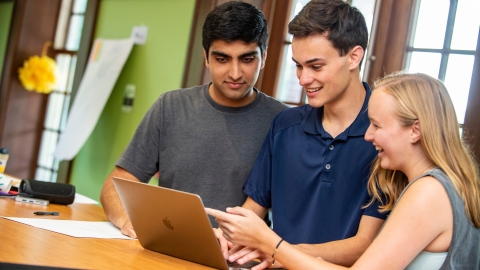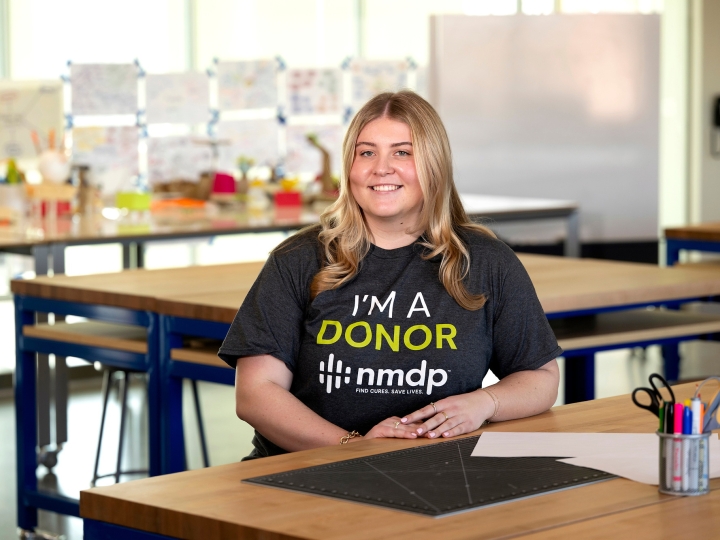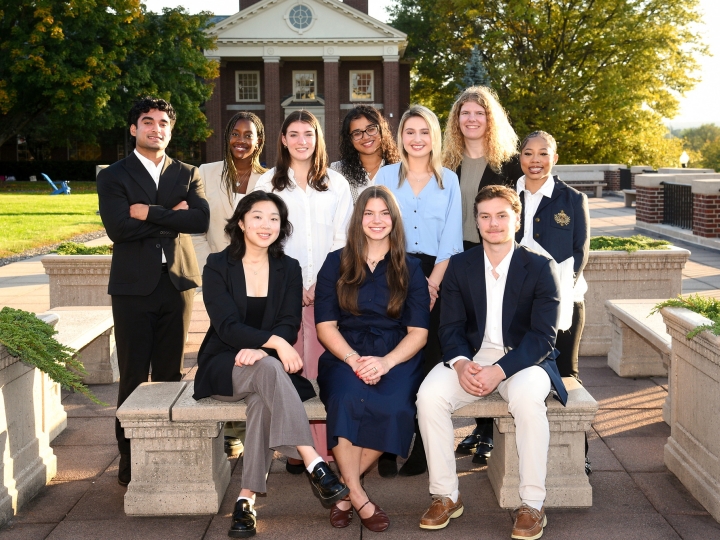
Bucknell Students Teach Peers to Be Better Problem Solvers with Innovative Approach
December 13, 2019
Kartikeya Sharma '21, Ryan Bailis '21, and Julia Knox '21 led a design thinking workshop at nearby Susquehanna University. Photo by April Bartholomew
In today's world, there's no shortage of what Ryan Bailis '21 calls "wicked problems" — issues that can only be tackled with novel, innovative ideas. The computer engineering and management major is one of three Bucknell students equipping undergrads with tools to conquer these complex challenges — not only on their own campus, but in the world around them.
Last year, Bailis worked with Julia Knox '21 and Kartikeya Sharma '21 to create a new experiential learning program for incoming Bucknell students. The topic: design thinking, a problem-solving process that helps creators develop effective, actionable solutions.
When the opportunity to share the innovative process with other local college students arose, the team sprang into action. This fall, Sharma, Knox and Bailis led a three-hour design thinking workshop at Susquehanna University, located about 15 miles south of Bucknell's campus.
Unlike more formulaic problem-solving methods, design thinking emphasizes uninhibited imagination and interactive brainstorming.

Students use sticky notes to brainstorm during the 2019 Design Thinking pre-orientation. Photo by April Bartholomew
"Design thinking is all about unconferencing — everybody moving around and having a voice during the process," explains Sharma, a computer science & engineering major. "It's getting up and putting colorful sticky notes on walls and actively engaging with feedback."
For the workshop, Susquehanna students came prepared to troubleshoot issues with dining and laundry services on their campus. Sharma, Knox and Bailis led teams through a series of interactive activities to guide the creative thinking process.
One such activity, called "No Bad Idea," challenged students to use two random words as a blueprint for pitching an imaginary product. Knox was particularly impressed with the idea for a "tectonic stapler" that fastens California to the U.S. if a catastrophic earthquake hits.
"The activities are all about getting inventive thinking going, which is essential to design thinking," says Knox, who is majoring markets, innovation & design. "It's been great to see the students embrace the process."
Empowering Problem Solvers
Sharma, Knox and Bailis became experts in design thinking through the University Innovation Fellows program, a nationwide effort coordinated by Stanford University that trains college students to use design thinking to create student-centric learning experiences on their campuses. Twenty Bucknell students have been selected to take part in the program since 2012.
Sharma, Knox and Bailis are three of eight current Innovation Fellows at Bucknell. In addition to solving problems on campus, the three work with the cohort to develop student programs centered on entrepreneurship and design thinking.
They currently co-direct the Design Thinking Leadership pre-orientation program, a five-day seminar held prior to New Student Orientation at the start of the fall semester. The pre-orientation — which debuted last year — invites incoming first-year students to generate solutions for problems facing local businesses. Students in the most recent pre-orientation partnered with Lewisburg's local Thai restaurant to improve the eatery's communications plan and food delivery options.

Bailis and Knox (top right) talk through ideas with students during the 2019 Design Thinking pre-orientation. Photo by April Bartholomew
The program caught the attention of Emma Fleck, a professor of management at Susquehanna. In January, she invited Sharma, Knox and Bailis to lead a condensed design thinking workshop for her class. The team recently returned to the university to host their second event, which was open to students from all majors.
"The movement of bringing design thinking to higher education is really powerful because it can break some of those silos that exist between certain disciplines. It's so accessible and adaptable," Sharma says. "It also gives college students the confidence to approach real-world problems, which we don't always feel we have the power or tools to do."
After two successful sessions at Susquehanna, the team is looking to take their workshop to other nearby universities. Eventually, they hope to host events at local high schools and expose even younger students to the power of design thinking.
"We've all been pretty involved at Bucknell from day one," Knox says. "Leading design thinking workshops is a great opportunity for us to help others fill the holes they see and make positive change."

